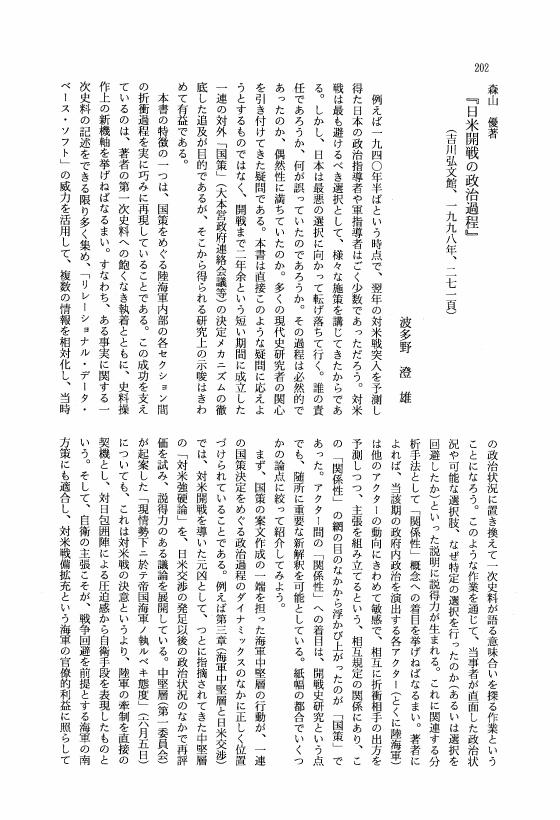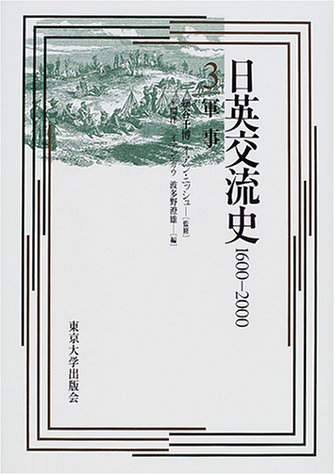83 0 0 0 OA 学術対話 : 日中歴史共同研究における南京大虐殺
73 0 0 0 IR 学術対話 : 日中歴史共同研究における南京大虐殺
18 0 0 0 OA 学術対話 : 日中歴史共同研究における南京大虐殺
- 著者
- 張 連紅 波多野 澄雄 庄司 潤一郎 栄 維木
- 出版者
- 立命館大学経済学会
- 雑誌
- 立命館経済学 = 立命館経済学 (ISSN:02880180)
- 巻号頁・発行日
- vol.61, no.3, pp.376-390, 2012-09
18 0 0 0 OA 国立公文書館アジア歴史資料センター15年の取り組み:歴史資料データベースの構築とサービス
- 著者
- 波多野 澄雄 大野 太幹
- 出版者
- 国立研究開発法人 科学技術振興機構
- 雑誌
- 情報管理 (ISSN:00217298)
- 巻号頁・発行日
- vol.59, no.7, pp.465-471, 2016-10-01 (Released:2016-10-01)
- 参考文献数
- 2
国立公文書館アジア歴史資料センター(アジ歴)は2001年11月に設立され,2016年で16年目を迎える。その間,日本とアジアにかかわる近現代の歴史資料(デジタル化資料)約200万件・約3,000万画像をデータベース化して,広く利用者に提供している。本稿では,アジ歴の現状および最近の取り組みを紹介するとともに,大規模な歴史資料のデータベースを,専門家以外の利用者に対しても,いかに利用しやすく提供するかについて,特に,センター独自の目録データ(メタデータ)項目,およびそれら目録データから抽出した検索用のキーワードをより理解しやすくするための新規作成コンテンツ「アジ歴グロッサリー」について,詳しく紹介する。また,他機関との連携など,アジア歴史資料のハブとしての機能を充実させるための取り組みについても,いくつかの事例を挙げて紹介する。
13 0 0 0 OA 臼井勝美先生の思い出 追悼 臼井勝美先生
11 0 0 0 アジア・モデルとしての「吉田ドクトリン」 (特集 自衛隊創設五〇周年)
- 著者
- 波多野 澄雄 佐藤 晋
- 出版者
- 錦正社
- 雑誌
- 軍事史学 (ISSN:03868877)
- 巻号頁・発行日
- vol.39, no.4, pp.4-20, 2004-03
8 0 0 0 OA 重光葵と大東亜共同宣言 -戦時外交と戦後構想-
- 著者
- 波多野 澄雄
- 出版者
- 財団法人 日本国際政治学会
- 雑誌
- 国際政治 (ISSN:04542215)
- 巻号頁・発行日
- vol.1995, no.109, pp.38-53,L7, 1995-05-20 (Released:2010-09-01)
- 参考文献数
- 57
Among wartime leaders in Japan, no one was more aware that the issue of World War II centered on decolonization than Foreign Minister Shigemitsu Mamoru (April 1943-April 1945). As Ambassador to China (January 1942-April 1943), Shigemitsu had become the strong supporter of Japan's “New Deal for China” to approve the Wang Ching-wei regime's voluntary self-independence and freedom. When he became Foreign Minister, Shigemitsu continued to promote “independence, freedom, and mutual equality” towards Asian occupied area as the main principles of Japan's “New Deal for Greater East Asia”. This set of “New Deal” policy could provide a “basic maneuver” for peace proposals towards the Allied Powers. In othe words, if Japan changed its war aims in accordance with those of Great Britain and the United States, there would be no more reason for Japan to keep fighting with China, the United States and Great Britain. At the opening of the Greater East Asian Conference in November 1943, Shigemitsu and the bureaucrats of the Foreign Ministry used the Greater East Asian Declaration as an opportunity to redefine Japan's war aims and to appeal to the Allied Powers with their basic peace maneuver. From the viewpoint of Shigemitsu, however, “New Deal” policy including the Greater East Asian Declaration was as much for domestic as for foreign use, to give the Japanese people a clearer conception of war aims, and to reform the militarism which had caused Japan to fall into military colonialism towards Asia. When he was aware that it was impossible to use the “New Deal” policy for domestic reform to exclude military colonialism from Japan, he insisted that the Japanese Government should accept “unconditional surrender” on their own initiative for the attainment of the same purpose.
2 0 0 0 OA 細谷 雄一 著『歴史認識とは何か――日露戦争からアジア太平洋戦争まで』
- 著者
- 波多野 澄雄
- 出版者
- 国際安全保障学会
- 雑誌
- 国際安全保障 (ISSN:13467573)
- 巻号頁・発行日
- vol.44, no.2, pp.96-100, 2016-09-30 (Released:2022-04-01)
- 著者
- 波多野 澄雄
- 出版者
- 一般財団法人 日本国際政治学会
- 雑誌
- 国際政治 (ISSN:04542215)
- 巻号頁・発行日
- vol.1995, no.109, pp.38-53,L7, 1995
Among wartime leaders in Japan, no one was more aware that the issue of World War II centered on decolonization than Foreign Minister Shigemitsu Mamoru (April 1943-April 1945). As Ambassador to China (January 1942-April 1943), Shigemitsu had become the strong supporter of Japan's “New Deal for China” to approve the Wang Ching-wei regime's voluntary self-independence and freedom. When he became Foreign Minister, Shigemitsu continued to promote “independence, freedom, and mutual equality” towards Asian occupied area as the main principles of Japan's “New Deal for Greater East Asia”. This set of “New Deal” policy could provide a “basic maneuver” for peace proposals towards the Allied Powers. In othe words, if Japan changed its war aims in accordance with those of Great Britain and the United States, there would be no more reason for Japan to keep fighting with China, the United States and Great Britain. At the opening of the Greater East Asian Conference in November 1943, Shigemitsu and the bureaucrats of the Foreign Ministry used the Greater East Asian Declaration as an opportunity to redefine Japan's war aims and to appeal to the Allied Powers with their basic peace maneuver. From the viewpoint of Shigemitsu, however, “New Deal” policy including the Greater East Asian Declaration was as much for domestic as for foreign use, to give the Japanese people a clearer conception of war aims, and to reform the militarism which had caused Japan to fall into military colonialism towards Asia. When he was aware that it was impossible to use the “New Deal” policy for domestic reform to exclude military colonialism from Japan, he insisted that the Japanese Government should accept “unconditional surrender” on their own initiative for the attainment of the same purpose.
2 0 0 0 OA リース・ロスの極東訪問と日本-中国幣制改革をめぐって-
- 著者
- 波多野 澄雄
- 出版者
- JAPAN ASSOCIATION OF INTERNATIONAL RELATIONS
- 雑誌
- 国際政治 (ISSN:04542215)
- 巻号頁・発行日
- vol.1978, no.58, pp.86-104,L4, 1978-03-10 (Released:2010-09-01)
- 参考文献数
- 98
Leith-Ross mission's visit to Far East (1935-36) was made along the Chamberlain-Fisher Line, and one of purposes of the visit was to attain an Anglo-Japanese cooperation on China issues through co-operative aid to monetary reforms in China.The monetary crisis in China arose from America's 1934 silver policy. The policy makers in Japan, however, had a very optimistic view about the crisis and took Leith-Ross mission's proposals forming a line in the chain of past co-operative economic aid to China. Therefore Japan accepted the proposals within the frame-work of Japan's China policy as was represented by the Amau doctorine.The Japanese Army particularly interpreted the decisive monetary reforms of November in 1935 as defense and expansion of England's rights and interests in China. As a result, the Army took measures to destroy the new monetary system by swiftly propelling the autonomous movement in North China which included the separation of monetary system in North China from Nanking government. The Army also helped the smuggling trade through the demilitarized zone in North China leading to the destruction of the maritime customs.Leith-Ross mission holding the stabilization of the new monetary system as its first aim came to lack a strong confidence in the Army who conducted those political and economic maneuverings in North China. In addition to that, the policy makers in Japan still relying upon the logic of the Amau doctorine tried to treat the maneuverings in North China as domestic affairs of the Nanking government.As far as those circumstances existed there couldn't be found favourable conditions to realize an Anglo-Japanese co-operation on China issues.
2 0 0 0 OA I 歴史研究
- 著者
- 臼井 勝美 安岡 昭男 池井 優 波多野 澄雄 増田 弘 宇野 重昭 横山 宏章 中見 立夫 植田 隆子 佐々木 雄太 油井 大三郎 福田 茂夫 草間 秀三郎 佐藤 信一
- 出版者
- 財団法人 日本国際政治学会
- 雑誌
- 国際政治 (ISSN:04542215)
- 巻号頁・発行日
- vol.1979, no.61-62, pp.2-107,L4, 1979-05-25 (Released:2010-09-01)
The Japan Association of International Relations, which was established in 1956, considers one of its main objectives to contribute to the progress of the study of the history of international relations, in paticular to research into the history of Japanese diplomacy. Japan's Road to the Pacific War is a representative example of what can be done by the joint endeavour of this association.We would like to point out, as a specific characteristics of recent research on the history of international relations, firstly, a tendency to remove the limitations which are encountered by a study of so called “diplomatic history” in isolation from everything else.We would like to examine the change from the move traditional approaches, which have emphasized only bilateral or multilateral relations between states, to the more modern, original approaches. The interest of researchers will be to cover a wide area of historical phenomena, such as the political decision-making process, public opinion, economic pressure groups and the process of communication amongst other things.The second characteristic has been the flowering of collaborative reserch between Japanese and foreign scholars, and we are now receiving the excellent results of their labours. For instance, the conference at Lake Kawaguchi in 1969, the result of which was, “The history of Japanese-American Relations, 1931-41” is a representative example of this trend. However, it is regrettable that the participants in these collaborative research projects have been mainly limited to Japanese and American scholars. It is to be hoped that, in future, there will be further opportunities for collaborative research and conferences not only with American scholars, but also with scholars from China, England, Korea, the Soviet Union and South East Asia.We hope the future tendency of research will be for the themes of the role and limitation of the individual in international affairs, as well as the problem of individual responsibility, to become the common interest of scholars.We hope that, in future, the increasing variety of scholarship will not become merely scattered and diffused.
2 0 0 0 OA 森山優著『日米開戦の政治過程』
- 著者
- 波多野 澄雄
- 出版者
- 財団法人 日本国際政治学会
- 雑誌
- 国際政治 (ISSN:04542215)
- 巻号頁・発行日
- vol.1999, no.122, pp.202-205, 1999-09-24 (Released:2010-09-01)
2 0 0 0 OA 戦時日本の 「地域主義」 と 「国際主義」
- 著者
- 波多野 澄雄
- 出版者
- 文部省科学研究費補助金重点領域研究「総合的地域研究」総括班
- 雑誌
- 重点領域研究総合的地域研究成果報告書シリーズ : 総合的地域研究の手法確立 : 世界と地域の共存のパラダイムを求めて
- 巻号頁・発行日
- vol.27, pp.37-55, 1996-11-30
- 著者
- 波多野 澄雄 井上 正也 冨塚 一彦
- 出版者
- 外務省外交史料館
- 雑誌
- 外交史料館報 = Journal of the Diplomatic Archives (ISSN:09160558)
- 巻号頁・発行日
- no.34, pp.25-40, 2021-03
- 著者
- 波多野 澄雄
- 出版者
- 慶應義塾大学法学研究会
- 雑誌
- 法学研究 (ISSN:03890538)
- 巻号頁・発行日
- vol.89, no.7, pp.117-128, 2016-07
紹介と批評
1 0 0 0 和解学創成へむけての全体調整と国際連携
1 0 0 0 特集 シンポジウム 和解学の創成
1 0 0 0 軍事
- 著者
- 平間洋一 イアン・ガウ 波多野澄雄編
- 出版者
- 東京大学出版会
- 巻号頁・発行日
- 2001
- 著者
- 波多野 澄雄
- 出版者
- JAPAN ASSOCIATION OF INTERNATIONAL RELATIONS
- 雑誌
- 国際政治 (ISSN:04542215)
- 巻号頁・発行日
- vol.2011, no.166, pp.166_156-159, 2011
- 著者
- 波多野 澄雄
- 出版者
- 企業史料協議会
- 雑誌
- 企業と史料 (ISSN:09123849)
- 巻号頁・発行日
- vol.11, pp.40-50, 2016-05



